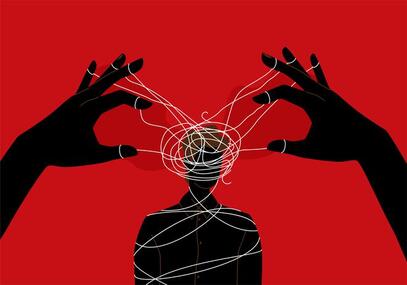|
Gaslighting is a form of psychological manipulation in which one person makes another person doubt their perceptions, experiences, memories, or understanding of events that happened. It is a subtle and insidious form of abuse that can have a devastating impact on the victim's mental and emotional health.
Gaslighting can occur in any type of relationship, but it is particularly common in romantic relationships. This is because romantic partners often have a high level of trust and intimacy, which makes them more vulnerable to manipulation. Gaslighters typically use a variety of tactics to achieve their goals, including:
If you are in a relationship with someone who is gaslighting you, it is important to seek help from a qualified psychotherapist. A therapist can help you to understand what is happening to you, and they can provide you with support and guidance as you work to recover from the effects of gaslighting. Here are some tips for coping with gaslighting in a relationship:
It is also important to remember that you are not alone. If gaslighting is a problem in your relationship, therapy can help. Contact Scott at (303) 817-8369 or email at [email protected] for a free phone or video evaluation. I often work with clients who are struggling to set boundaries with a narcissist. Narcissists are people with a personality disorder that is characterized by a grandiose sense of self-importance, a need for admiration, and a lack of empathy for others.
Narcissists can be very difficult to deal with, as they often try to control and manipulate the people around them. They may also be very critical and demanding. It is important to remember that you cannot change a narcissist's behavior. However, you can set boundaries to protect yourself from their abuse. Here are some tips for setting boundaries with a narcissist:
Here are some additional tips for setting boundaries with a narcissist:
It is important to remember that you cannot change a narcissist. However, you can set boundaries to protect yourself from their abuse. By setting and enforcing boundaries, you are taking steps to protect your well-being. If you are struggling to set boundaries with a narcissist, please know that you are not alone. There are people who care about you and want to help. Please reach out to a friend, family member, therapist, or other support person for help. I can help. Call Scott at (303) 817) 8369 or email at [email protected] for a free phone or video evaluation. The Relationship Between Sensitivity and Boundary Issues
Sensitive people are often more attuned to the emotions of others and their surroundings. This can be a gift, but it can also make it difficult to set and maintain healthy boundaries. Here are some of the reasons why sensitive people may struggle with boundaries:
Here are some of the ways that boundary issues can manifest in sensitive people:
If you are a sensitive person and you struggle with boundaries, there are a few things you can do to improve the situation:
It's important to remember that you have the right to set boundaries. You don't owe anyone an explanation for why you need to set a boundary. And you don't have to apologize for setting a boundary. Setting boundaries is a way of taking care of yourself and protecting your well-being. Here are some additional tips for sensitive people who struggle with boundaries:
Setting boundaries can be difficult for anyone, but it's especially challenging for sensitive people. However, it's important to remember that you have the right to set boundaries, and that doing so is essential for your well-being. Remember, seeking help is a courageous step towards a more balanced and fulfilling life. You don't have to face these challenges alone. If you're ready to embark on a journey of self-discovery, growth, and healthier relationships, I invite you to schedule a confidential consultation with me. Together, we can work towards a happier, more harmonious life. Take the first step towards healing today. Contact Scott Olds at (303) 817-8369 or email at [email protected] for a free and confidential evaluation by phone or video. If you are a highly sensitive person (HSP) in an abusive relationship, you may feel overwhelmed, exhausted, and even hopeless. You may be wondering if you are crazy or if you are just too sensitive.
The truth is, you are not crazy. You are simply a highly sensitive person who has gotten into a relationship with an abuser. Abuse can take many forms, including physical, emotional, verbal, and financial abuse. As an HSP, you are naturally empathic and caring. You are drawn to people who are in need, and you want to help them. This makes you a prime target for an abuser. Abusers are often very good at manipulating and controlling others, and they can easily take advantage of your sensitivity. If you are in an abusive relationship, you may be experiencing some of the following:
If you are ready to get out of your abusive relationship, there are a few things you can do:
If you are a highly sensitive person in an abusive relationship, please know that you are not alone. There is help available. Please reach out to Scott Olds, Psychotherapist, for support. Here are some additional resources that you may find helpful:
IntroductionCodependency is a complex issue that can severely impact the dynamics of a romantic relationship. It is characterized by an excessive emotional or psychological reliance on a partner, often leading to an unhealthy and unbalanced relationship dynamic. Recognizing the signs of codependency and seeking couples counseling can be instrumental in breaking free from these patterns and fostering healthier, more fulfilling partnerships. In this article, we will explore codependency, its effects on relationships, and how couples counseling can help couples navigate these challenges. Understanding CodependencyCodependency is a behavioral and emotional condition that commonly arises from dysfunctional family dynamics, childhood trauma, or unhealthy attachment styles. Individuals who are codependent often have an intense fear of abandonment, low self-esteem, and a strong desire for external validation. This can manifest in several ways, such as excessively focusing on the needs of others, neglecting personal boundaries, and having difficulty expressing one's own needs and desires. Effects of Codependency on RelationshipsCodependency can have a detrimental impact on the health and happiness of a relationship. Some common effects include:
Couples Counseling as a SolutionCouples counseling provides a safe and supportive environment for couples to address the underlying issues contributing to codependency and work towards healthier relationship patterns. Here's how couples counseling can be beneficial:
ConclusionCodependency can be a challenging issue to overcome, but couples counseling offers a pathway to healing and growth. By addressing the underlying causes and learning healthier relationship patterns, couples can break free from the grip of codependency and cultivate a stronger, more fulfilling partnership. Seeking professional help is a courageous step towards building a healthier future together. Remember, change is possible, and with the right support, couples can break free from codependency and create a relationship built on trust, respect, and mutual growth.
|
AuthorScott F. Olds, Psychotherapist Categories
All
Archives
February 2024
Call Scott at
|
Package Discount: Get a 4-session package for 10% off! Call for details.
I offer sessions in the office, in an open space (weather permitting), by phone, and by video sessions for your safety and convenience. Take a deep breath and give me a call at (303) 817-8369 or email me at [email protected].
Confidential: I am HIPAA compliant, so your privacy is protected.
Crisis Information: If you are in crisis, call Colorado Crisis and Support at 844-493-8255 or the national Suicide and Crisis Lifeline at 988 for 24/7 for help in an emergency. These lifelines provide free and confidential support for people in distress, prevention, and crisis resources for you or your loved ones.
(303) 817-8369
[email protected]
10960 W. 65th Way
Arvada, Colorado 80004
My office is in Arvada, Colorado.
Privacy Policy







